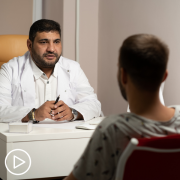Making Lifestyle Changes When Living With an MPN
Making Lifestyle Changes When Living With an MPN from Patient Empowerment Network on Vimeo.
As a myelofibrosis (MF) and essential thrombocythemia (ET) patient, Julia Olff has experienced lifestyle changes in her MPN journey. Watch as she shares changes she made with her work life and eating habits and the impact on her well-being as an MPN patient.
See More From the MPN TelemEDucation Resource Center
Related Resource:

|

|
Transcript:
Julia Olff:
I’ve definitely made many lifestyle changes since I’ve been diagnosed with ET and then myelofibrosis. The biggest change came when I needed to give up full-time work and began to work on a very part-time basis, so that’s been the most monumental change, and it really came about because of how unwell I was feeling, how much pain I was going through at the time, I also had a mini-stroke and became more involved in is hospitalized that I needed more treatment than I was seeing more…more specialists for a short period of time, and my husband and I recognized that to maintain my well-being, I needed to step off of the 50-hour week plus travel job that I was doing, so that was a really big change and that continues to influence my life, however, I’ve found a lot of positives in that I’m fortunate that I’ve been able to financially sustain my life while working part-time and find other aspects of my life that are fulfilling. For example, I volunteer a lot more. I’ve made changes in the way that I eat and the way that I sleep, so myelofibrosis has certainly caused a lot more fatigue over the years. And while when I was working full-time, I don’t think I was getting the amount of sleep that I really needed, and fatigue started to really weigh on me, and I remember driving and just feeling like, “Oh my God, I can’t do this,” so I make sure that I go to bed much earlier than I used to and try to wake up about the same time every day, and it’s also helped with some of the insomnia that I know people with myelofibrosis on the flip side, have with the fatigue. I’ve been hospitalized a few times for colitis, and there are all sorts of potential for bleeding with myelofibrosis, and we’re not sure that that was related, but I learned that I needed to change the way I was eating, and I can’t say that I did it immediately.
It took seeing a gastroenterologist, who evaluated all of my records and several more colonoscopies to get and the terrible, terrible pain of colitis to realize I needed to change the way I was eating, and I also had some weight gain with one of the medications that I was on…and so I enrolled in Weight Watchers, which I found to be incredibly helpful to help me lose some weight and did help me pump up the fruits and vegetables in my diet, especially when I learned you can eat lots of those…but less of other things. So those are some of the changes. And the last one I say is really learning to pace myself and to not overdo it, and that’s a longer learning process, I think, and figuring out that you don’t have the same kind of energy that you had pre-illness, where you can kind of push your day…you can do one more thing, one to one more place, add one more task to do is when you’re out, I’m much more of a planner, and I allow myself much more time to get things done, and I spread them out over several days, what I might have done in one day in the past.







